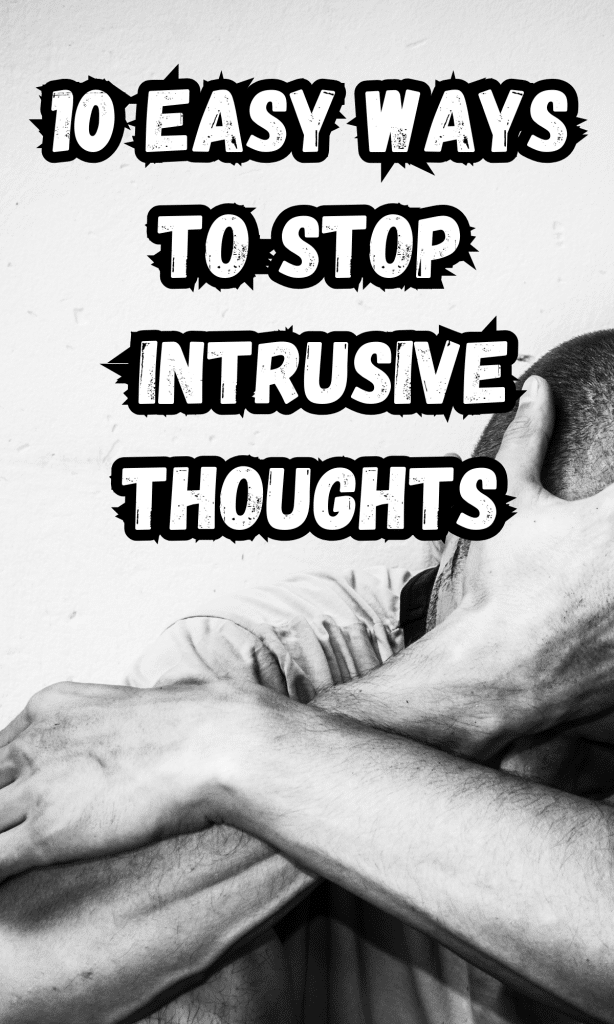Intrusive thoughts can be unsettling, often sneaking into our daily life uninvited. Whether it’s worrying about the future, reliving a traumatic event, or battling disturbing thoughts, these mental intruders can be a source of significant distress.
There are strategies to manage and reduce these unwanted thoughts. Here are ten easy ways to help you reclaim your peace of mind.

1. The First Step
Recognizing intrusive thoughts is the first step in managing them. Whether it’s obsessive thoughts about a health issue or repetitive thoughts about social interactions, labeling these as ‘intrusive’ helps in detaching from them.
2. Mindfulness Meditation

Mindfulness meditation is a great way to focus on the present moment. It helps in redirecting attention away from such thoughts and brings you back to the here and now.
3. Rewire Your Thought
Cognitive Behavioral Therapy (CBT) is an effective treatment for managing negative thoughts. It helps in identifying and challenging irrational beliefs, thus changing your thought patterns.
4. Exercise
Engaging in physical activities can improve your overall mental health. Exercise releases endorphins, which are natural mood lifters, helping to alleviate anxiety and depression.
5. Talk It Out
Sometimes, sharing your thoughts with a trusted family member or friend can provide a new perspective and lessen their intensity.
6. Professional Help

If intrusive thoughts are causing a lot of distress, seeking professional help is the best way forward. Mental health professionals can offer different types of therapy and treatment options tailored to your needs.
7. Healthy Sleep Habits
Lack of sleep can exacerbate intrusive thoughts. Establishing a healthy sleep routine can significantly improve your mental well-being.
8. Limit Stimulants
Substance abuse can worsen symptoms of mental health conditions. Limiting or avoiding substances like alcohol and caffeine can help in managing intrusive thoughts.
9. Embrace Your Thoughts
Instead of fighting your thoughts, acceptance and commitment therapy teaches you to accept them as mere thoughts and commit to living a life aligned with your values, despite them.
10. Stay Busy
Engaging in activities that you enjoy can help divert your mind from unwanted intrusive thoughts. Whether it’s a hobby, reading, or spending time with loved ones, keep your mind engaged.
Understanding Intrusive Thoughts

Intrusive thoughts can range from mildly annoying to extremely distressing. Examples of intrusive thoughts include violent thoughts, obsessive thinking about sexual acts, or fears about one’s sexual orientation.
While everyone experiences occasional intrusive thoughts, those with mental health disorders may find them overwhelming and persistent.
Intrusive thoughts can be a source of much distress, often sneaking into our daily lives uninvited and unwelcome.
These thoughts are not just random worries; they are often distressing thoughts that can be intense and persistent.
People might find themselves obsessively worrying about the future, reliving traumatic experiences, or grappling with violent intrusive thoughts.
Such mental intrusions can be particularly challenging for individuals with mental health disorders, including obsessive-compulsive disorder (OCD), panic attacks, social anxiety, or other forms of mental illness.

For those battling these intrusive thoughts, it can feel like being trapped in a worst-case scenario playing on a loop in their minds.
These thoughts can provoke emotional distress, exacerbating symptoms of existing conditions such as anxiety disorders or eating disorders. In severe cases, they might lead to a hard time managing day-to-day activities, impacting one’s ability to function effectively.
Managing these intrusive thoughts is not just a good idea; it’s essential for mental well-being. The most effective way to tackle them varies from person to person.
For some, a type of therapy such as cognitive-behavioral therapy (CBT) can be incredibly helpful.
This form of therapy helps individuals understand and change the patterns of their own thoughts, aligning them more closely with the person’s values and reducing the power these intrusive thoughts hold.
However, for others, the journey might involve different ways of coping, such as mindfulness practices, medication, or lifestyle changes.
It’s important to remember that experiencing these types of thoughts does not make someone a bad person; they are a common aspect of many mental disorders and not a reflection of one’s character.

In cases where intrusive thoughts are linked to a mental health disorder, seeking professional help is often the only way to effectively manage them.
This can include specialized types of CBT tailored to specific disorders like OCD or social anxiety, where the focus is on learning to cope with and gradually reduce the distress caused by these thoughts.
For some individuals, medication, such as selective serotonin reuptake inhibitors (SSRIs), can be an effective component of their treatment plan.
These medications are often used in conjunction with cognitive-behavioral therapy (CBT) to manage symptoms of obsessive-compulsive disorder (OCD) and other anxiety disorders.
Intrusive thoughts can consume a lot of time and energy, leading to compulsive behaviors or repetitive behaviors as a way to cope.
For people struggling with mental health issues like bipolar disorder, postpartum depression, or panic disorder, these thoughts can cause great distress and significantly impact day-to-day life.

New mothers may experience postpartum depression, where intrusive thoughts about their baby or their own body image can be particularly challenging.
Young adults, often navigating periods of stress and identity formation, may also find themselves grappling with these disturbing thoughts.
A comprehensive treatment plan, possibly including therapy types like response prevention therapy or commitment therapy, is crucial.
These therapies, often part of a broader cognitive-behavioral approach, help individuals challenge and change their thought patterns.
Reaching out to mental health services in the United States, consulting with a CBT therapist, or even talking to a health care provider can provide much-needed support.
The National Institute of Mental Health and organizations like the Depression Association of America offer resources and guidance for those seeking help.
Intrusive thoughts can be a symptom of an underlying problem, such as past trauma, mood disorders, or even physical conditions like Parkinson’s disease. Understanding this connection is crucial in addressing the root cause of the distress.
Ongoing research studies continue to shed light on the most effective ways to manage different types of intrusive thoughts.
Reading blog posts, participating in therapy, and staying informed about new treatment options can be empowering.
Conclusion

Intrusive thoughts, especially when they involve worst-case scenarios or violent content, can be deeply unsettling. However, with the right strategies and support, individuals can learn to manage these involuntary thoughts and minimize their impact.
Seeking medical help, especially during tough times, is not a sign of weakness, but rather a brave step towards better mental health.
Intrusive thoughts can be a symptom of a mental health condition like obsessive-compulsive disorder, post-traumatic stress disorder, or anxiety disorders.
They can create a lot of distress, but with the right strategies, such as mindfulness meditation, CBT, and seeking professional help, you can learn to manage them effectively.
Remember, it’s not just about getting rid of these thoughts; it’s about learning to coexist with them without allowing them to overtake your quality of life. You’re not alone in this journey, and there are many avenues for help and support.
Luciana, a proud Brazilian, blends her passion for jiu-jitsu with a deep-rooted connection to spirituality and well-being. Her dedication to the martial art reflects not just a physical discipline, but a holistic approach to life, seeking balance in mind, body, and spirit. Whether on the mats or in meditation, Luciana embodies the essence of harmony and inner strength.

Great tips, thanks for sharing.
These are such wonderful ideas – I definitely need this kind of support with my endless thoughts LOL. Thanks for sharing!